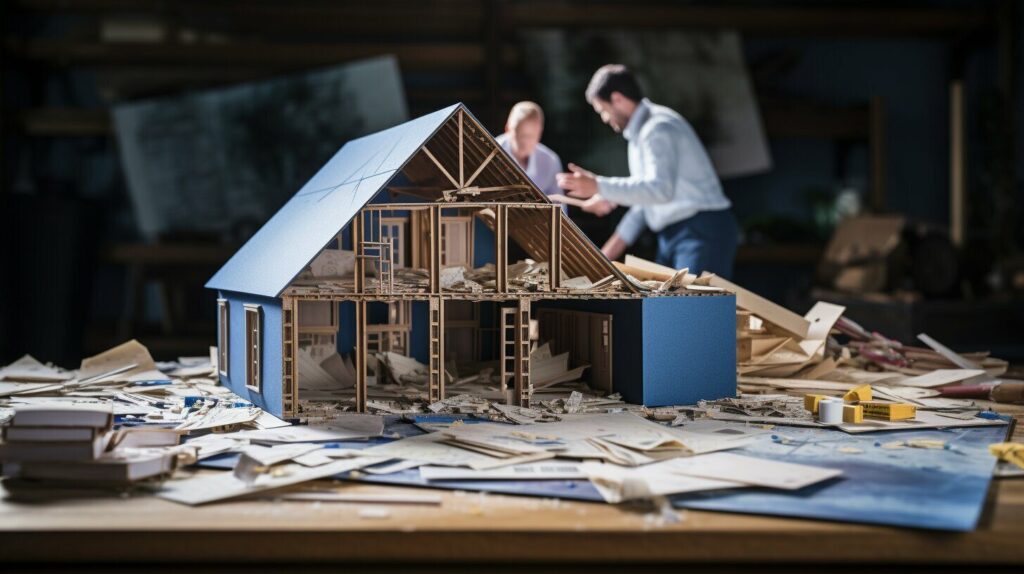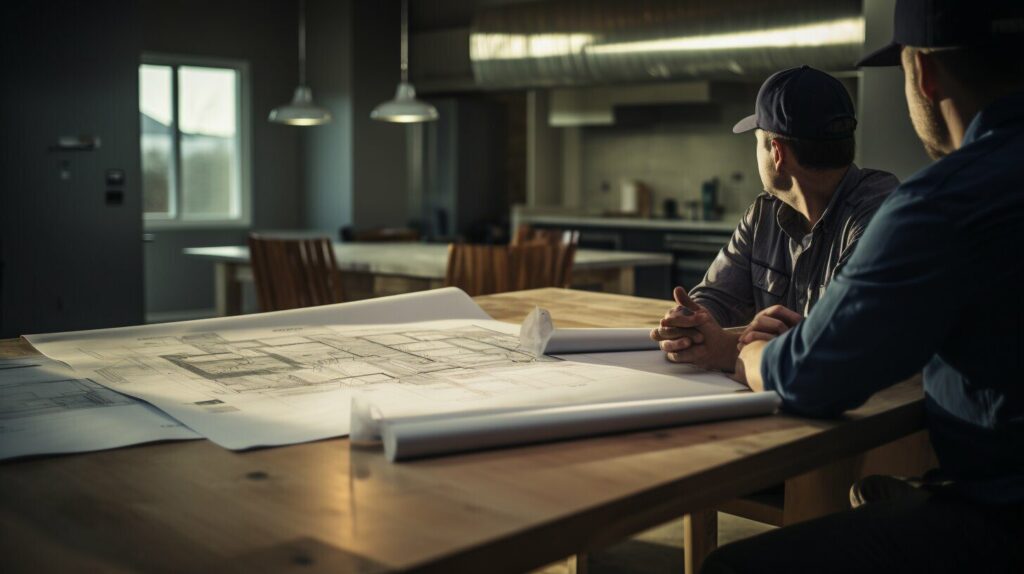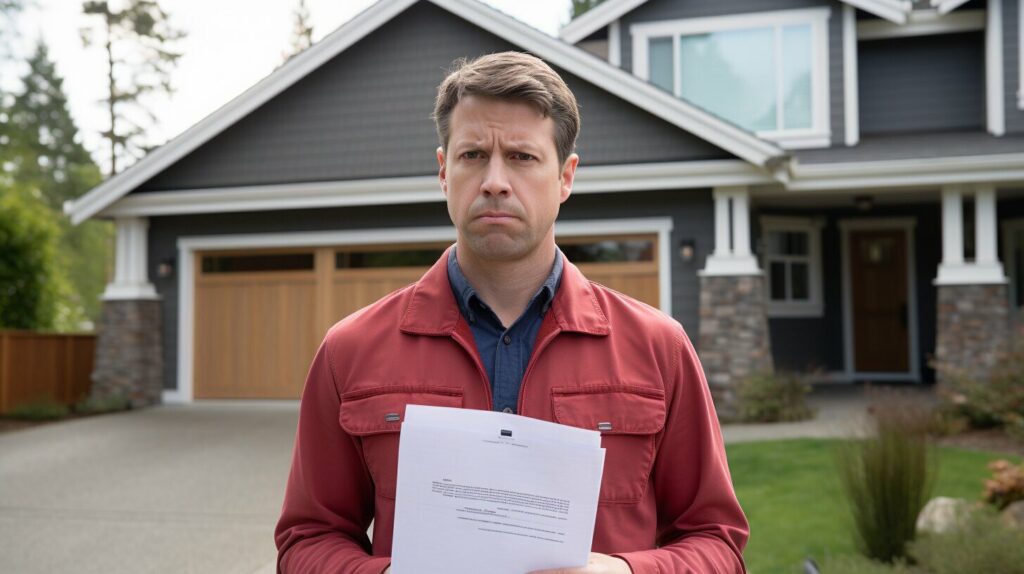
Key Takeaways:
- Consult with a construction law attorney to understand your legal options and rights.
- Filing a lawsuit against a home builder may be necessary if other avenues have been exhausted.
- Mediation can be a useful tool for resolving issues with a home builder.
- Document all communication and issues before proceeding with any legal actions.
- Understanding your homeowner’s rights in construction disputes is essential.
Filing a Lawsuit Against a Home Builder
If you have exhausted all other options and believe that a lawsuit is necessary, you may consider filing a lawsuit against the home builder. This can be done for various reasons such as breach of contract, construction defects, failure to complete work, or other issues related to the construction of your home. It is important to gather evidence and document all communication and issues before proceeding with a lawsuit.
Before filing a lawsuit, it is recommended to consult with a construction law attorney who can guide you through the legal process and assess the strength of your case. They can help you determine the best course of action based on your specific circumstances.
Keep in mind that filing a lawsuit can be a complex and time-consuming process. It is important to be prepared for the potential costs and length of litigation. However, a lawsuit can provide a means to seek compensation or resolution for the issues you have encountered with the home builder.
Filing a Lawsuit Against a Home Builder
| Steps to Consider when Filing a Lawsuit Against a Home Builder |
|---|
| Gather evidence of the construction issues or breaches of contract. |
| Document all communication and attempts to resolve the issues with the home builder. |
| Consult with a construction law attorney to assess the viability of your case. |
| File the lawsuit within the statute of limitations in your state. |
| Prepare for the potential costs and length of litigation. |
| Attend court hearings and provide supporting documentation for your claims. |
| Work with your attorney to negotiate a settlement or pursue a favorable judgment. |
Filing a lawsuit can be a significant step to hold a home builder accountable for their actions or negligence. It is crucial to follow the proper legal procedures and seek guidance from an experienced attorney to maximize your chances of success.
Homeowner’s Rights in Construction Disputes
As a homeowner, it is essential to be aware of your rights in construction disputes with a home builder. Understanding these rights can help you navigate the dispute resolution process more effectively and ensure that your concerns are addressed. While the specific homeowner’s rights may vary depending on the laws in your state and the terms of your contract, there are some common rights that homeowners generally have in construction disputes.
Right to a properly constructed home
One of the fundamental rights of homeowners in construction disputes is the right to a properly constructed home. This means that the builder is responsible for delivering a home that meets the agreed-upon specifications and quality standards. If there are construction defects or problems with the workmanship that affect the structural integrity or safety of your home, you have the right to request repairs or corrections from the builder.
Right to a safe living environment
Another important right for homeowners is the right to a safe living environment. Builders have a duty to ensure that the construction process complies with applicable building codes and regulations. If there are safety hazards or violations of building codes that pose a risk to you and your family, you have the right to request that the builder address these issues promptly.
Right to reasonable completion timelines
Homeowners also have the right to reasonable completion timelines for their home construction projects. This means that the builder should complete the work within the agreed-upon timeframe or a reasonable timeframe based on industry standards. If there are significant delays or the builder fails to complete the work within a reasonable timeframe, you may have the right to pursue legal action or seek compensation for the damages caused by the delay.
| Right | Description |
|---|---|
| Right to a properly constructed home | The builder is responsible for delivering a home that meets the agreed-upon specifications and quality standards. |
| Right to a safe living environment | Builders have a duty to ensure that the construction process complies with applicable building codes and regulations. |
| Right to reasonable completion timelines | Homeowners have the right to reasonable completion timelines for their home construction projects. |
| Right to warranty coverage | Builders may provide warranties that cover certain defects or issues that may arise after the completion of the construction. |
| Right to request repairs or corrections | Homeowners have the right to request that the builder address any defects, problems, or issues with the construction. |
Remember, the specific homeowner’s rights in construction disputes may vary. It is advisable to consult with a qualified attorney who specializes in construction law in your state to understand the specific rights and legal options available to you.
Mediation for Home Builder Issues
When facing issues with a home builder, homeowners often find themselves stuck in the midst of a frustrating and complex situation. This is where mediation can be a valuable tool in resolving disputes. Mediation is a voluntary and confidential process that involves the assistance of a neutral third party, the mediator, to facilitate communication and negotiation between the homeowner and the builder. It provides an opportunity for both parties to work towards a mutually agreeable resolution without the need for costly and time-consuming litigation.
One of the key benefits of mediation is that it allows homeowners and builders to maintain control over the outcome of the dispute. Unlike litigation, where a judge or jury makes the final decision, mediation empowers the parties involved to actively participate in finding a solution that meets their needs. The mediator helps create an environment where open and honest communication can take place, allowing for a better understanding of each party’s perspective and interests.
Mediation can be particularly useful in cases where there is a breakdown in communication between the homeowner and the builder. It provides a structured forum where both parties can express their concerns, discuss potential solutions, and explore alternatives. The mediator acts as a facilitator, guiding the conversation and ensuring that it remains focused on finding a resolution. By engaging in mediation, homeowners have the opportunity to address their grievances directly with the builder, potentially saving time, money, and stress.
Comparison of Mediation vs. Litigation
| Mediation | Litigation |
|---|---|
| Voluntary process | Compulsory process |
| Confidential | Public record |
| Parties control the outcome | Judge or jury makes the decision |
| Less expensive | Costly legal fees |
| Quicker resolution | Lengthy court process |
While mediation can be an effective means of resolving builder-related issues, it is important to note that it is not suitable for every situation. Some disputes may be too complex or contentious for mediation to be successful. Additionally, if either party is unwilling to participate in good faith or is not open to compromise, mediation may not be the best option.
If you are experiencing difficulties with your home builder and believe that mediation could be beneficial, you can file a complaint against the builder with your state’s contractor licensing board or consumer protection agency. They can guide you through the mediation process and help facilitate communication between you and the builder. By pursuing mediation, you give yourself the opportunity to address your concerns and resolve the dispute in a more amicable and efficient manner.
Builder Won’t Fix Problems – What to Do
If your builder is refusing to fix problems or defects in your home, it is important to take appropriate action. Start by documenting the issues and communication with the builder. Review your contract, warranty, or any other relevant agreements to determine your rights and obligations. You may need to pursue legal options or involve a third-party expert to assess the situation. Consult with an attorney who specializes in construction law to understand the best course of action based on your specific circumstances.
When a builder refuses to fix problems or defects, it can be frustrating and leave homeowners feeling helpless. However, by following the right steps, you can protect your rights and seek a resolution.
First, make sure you have a clear record of the issues you are experiencing. Document the problems in detail and keep copies of any communication with the builder regarding the issues. This will be crucial evidence if you need to escalate the matter.
“It is important to consult with a qualified attorney who specializes in construction law to determine the best course of action.”
Next, carefully review your contract, warranty, or any other agreements you have with the builder. Look for any clauses that outline the builder’s responsibility to address defects or issues. This will help you understand your rights and obligations.
If the builder continues to refuse to fix the problems, you may need to consider legal action. Consult with an attorney who specializes in construction law to understand the best approach for your situation. They can guide you through the legal process, advise you on the strength of your case, and help you pursue compensation for any damages or repairs necessary.
| Steps to Take if Your Builder Won’t Fix Problems |
|---|
| 1. Document the issues and communication with the builder |
| 2. Review your contract, warranty, or other agreements |
| 3. Consult with an attorney who specializes in construction law |
| 4. Consider legal action if necessary |
Builder’s Responsibility for Defects
When it comes to home construction, builders have a responsibility to ensure that the homes they build meet certain standards of quality and safety. This means that they are accountable for any defects that arise from their construction or workmanship. As a homeowner, it’s important to understand the scope of a builder’s responsibility and your rights in case of defects.
Common examples of defects that a builder may be responsible for include structural issues, plumbing or electrical problems, and other construction-related defects. If you discover these issues in your home, it’s crucial to take appropriate action to address them.
“It is the builder’s responsibility to construct homes that are free from defects and comply with industry standards. If they fail to meet these obligations, homeowners have the right to seek compensation for any damages or necessary repairs,” says John Smith, a construction law attorney.
If your builder refuses to fix defects in your home, you may have legal recourse to pursue compensation. Consulting with a construction law attorney who specializes in home construction disputes can help you understand the specifics of your builder’s responsibilities and explore your available options for resolution.
Builder’s Responsibility Table
| Defects | Builder’s Responsibility |
|---|---|
| Structural issues | The builder is responsible for ensuring the structural integrity of the home. |
| Plumbing or electrical problems | The builder is accountable for properly installing and maintaining plumbing and electrical systems. |
| Construction-related defects | The builder should address any defects that arise from their workmanship or construction processes. |
Remember, each situation is unique, and the recourse available to you may vary based on the specific circumstances and the laws in your state. Consulting with a construction law attorney is crucial in understanding your rights and pursuing the appropriate course of action.
How to File a Complaint Against a Home Builder
If you find yourself in a situation where you need to file a complaint against a home builder, there are several steps you can take to ensure your grievance is properly addressed. It is important to gather all relevant documentation, including contracts, warranties, and communication records, to support your complaint. This will help provide a clear and detailed explanation of the issues you are facing.
Research your state’s contractor licensing board or consumer protection agency to understand their complaint process. Each agency may have different guidelines and requirements, so it is essential to familiarize yourself with their specific procedures. Follow their instructions and submit your complaint along with all supporting documents.
When filing a complaint, be prepared to provide a thorough account of the problems you have encountered and clearly state your desired resolution. The more detailed and specific you can be, the better chance you have of the agency understanding the full extent of the issues and taking appropriate action.
The agency will typically review your complaint, assess the evidence provided, and conduct an investigation into the builder’s conduct. If they find evidence of misconduct or violations, they may take formal action against the builder, such as issuing fines or revoking their license. Keep in mind that the timeline for resolution can vary depending on the complexity of the case and the workload of the agency.
Steps to File a Complaint Against a Home Builder
| Step | Description |
|---|---|
| 1 | Gather all relevant documentation, including contracts, warranties, and communication records. |
| 2 | Research your state’s contractor licensing board or consumer protection agency to understand their complaint process. |
| 3 | Follow the agency’s guidelines for submitting your complaint and include all supporting documents. |
| 4 | Provide a detailed account of the issues you have encountered and specify your desired resolution. |
| 5 | Allow the agency to review your complaint and conduct any necessary investigations. |
| 6 | Be patient as the agency works to resolve your complaint. The timeline for resolution can vary. |
When filing a complaint against a home builder, it is important to be organized and thorough in your documentation and communication. Clearly articulating the issues and desired resolution will strengthen your case and increase the chances of a satisfactory outcome. Remember, the agency is there to protect your rights as a homeowner and hold builders accountable for any misconduct or violations.
Suing Home Builders – Legal Considerations
When dealing with issues and disputes with a home builder, it is important to understand the legal considerations involved in suing a home builder. Each state has its own statutes of limitations, which determine the time limit for filing a lawsuit. In Florida, for example, the statute of limitations for construction defects is four years from the discovery of the defect or the completion of the work. It is crucial to consult with a construction law attorney who is familiar with the laws of your state and specializes in home construction disputes to ensure that you file within the designated time frame.
In addition to the statute of limitations, there are other legal considerations to take into account when suing a home builder. These may include the requirement to provide notice to the builder of the defects or issues, the potential for mandatory mediation or alternative dispute resolution before filing a lawsuit, and the possibility of seeking attorney’s fees and costs if successful in the legal action.
“The legal process of suing a home builder can be complex and challenging. It is essential to have a skilled attorney by your side who can navigate the intricacies of construction law and advocate for your rights.” – Construction Law Attorney
Before proceeding with a lawsuit, it is crucial to gather evidence and document all communication and issues related to the construction of your home. This may include photographs, emails, contracts, warranties, and any other relevant documents. Your attorney will be able to advise you on the necessary evidence to support your case.
Statutes of Limitations for Suing Home Builders in Select U.S. States
| State | Statute of Limitations |
|---|---|
| California | 10 years from substantial completion or discovery of injury |
| New York | 6 years from substantial completion or discovery of defects |
| Texas | 4 years from substantial completion or discovery of defects |
| Florida | 4 years from discovery of defect or completion of work |
Consulting with a construction law attorney is crucial throughout the legal process of suing a home builder. They can guide you through the necessary steps, including filing the lawsuit, gathering evidence, negotiating with the builder, and representing you in court. By understanding the legal considerations and working with an experienced attorney, you can increase your chances of a successful outcome in your lawsuit against a home builder.
Discovering the Builder of Your Home
If you are unsure about the builder of your home, there are a few ways to discover this information. Start by reviewing your purchase documents or any other records related to the construction of your home. Look for any information that may indicate the builder’s name or company. This could include invoices, receipts, or contracts that were part of the home-buying process. Additionally, check your closing documents or title insurance policy for any mention of the builder.
If you are unable to find the builder’s name in your records, you can contact your local building department or county records office for assistance. These agencies typically keep records related to building permits and construction projects within their jurisdiction. Provide them with your property address and ask if they can provide any information about the builder. They may be able to provide you with the builder’s name or direct you to other resources that can help.
In some cases, you may need to hire a title company or conduct a property search to uncover the builder’s identity. Title companies specialize in researching property records and can help you gather information about the history of your home, including the builder’s name. Conducting a property search may involve reviewing public records, deeds, and other legal documents to trace the ownership and construction history of your home. This can be a more time-consuming process, but it can provide valuable information about the builder.
Knowing the builder of your home can be helpful if you need to pursue legal action or file a complaint. It allows you to address any issues or disputes directly with the responsible party. If you are still unable to determine the builder’s identity, consult with a construction law attorney who can guide you through the process and provide further assistance.
Conclusion
Dealing with issues and disputes with a home builder can be stressful and challenging. It is important to know your rights, gather evidence, and explore all available options before taking legal action. Consulting with a construction law attorney can provide valuable guidance and help you navigate the complex process. Remember that each situation is unique, and the recourse available to you may vary based on the specific circumstances and the laws in your state.
If you are facing issues with a home builder, it is advisable to consult with a qualified attorney who specializes in construction law. They can help you understand your legal options and rights, and guide you on the best course of action. Whether it’s filing a lawsuit, seeking mediation, or filing a complaint, having professional guidance can make a significant difference in the outcome of your dispute.
When dealing with a home builder, it’s essential to document all communication and issues, review your contract and warranty, and gather evidence to support your claims. This documentation will be crucial in any legal proceedings or mediation. Additionally, understanding the builder’s responsibilities and your rights as a homeowner in construction disputes is vital for effective resolution.
Remember that construction disputes can be complex and time-consuming. It is crucial to approach the situation with patience and persistence, seeking a resolution that protects your interests. By knowing your rights, seeking professional advice, and taking appropriate action, you can navigate the process with confidence and increase your chances of a favorable outcome.
FAQ
What recourse do I have against a home builder?
Your recourse against a home builder depends on the specific situation and the laws in your state. It is advisable to consult with a construction law attorney to determine the best course of action.
How can I file a lawsuit against a home builder?
To file a lawsuit against a home builder, gather evidence, document all communication and issues, and consult with a construction law attorney to understand the best approach based on your specific circumstances.
What are my rights as a homeowner in construction disputes?
Homeowner’s rights in construction disputes may include the right to a properly constructed home, the right to a safe living environment, the right to reasonable completion timelines, the right to warranty coverage, and the right to request repairs or corrections from the builder.
How can mediation help resolve issues with a home builder?
Mediation is a voluntary and confidential process where a neutral third party helps facilitate communication and negotiation between the homeowner and the builder. It can be a less costly and time-consuming alternative to litigation.
What should I do if my builder refuses to fix problems?
Start by documenting the issues and communication with the builder. Review your contract and consult with a construction law attorney to understand your rights and obligations. You may need to pursue legal options or involve a third-party expert.
What is a home builder responsible for regarding defects?
Home builders are typically responsible for defects that arise from their construction or workmanship. This includes issues such as structural defects, plumbing or electrical problems, and other construction defects.
How can I file a complaint against a home builder?
Gather all relevant documentation, research your state’s contractor licensing board or consumer protection agency, and follow their complaint process. Provide a detailed explanation of the issues and desired resolution.
What legal considerations should I be aware of when suing a home builder?
Each state has its own statutes of limitations for filing a lawsuit. Consult with a construction law attorney familiar with your state’s laws to determine the best approach for pursuing legal action.
How can I discover the builder of my home?
Review your purchase documents and contact your local building department or county records office for information about the builder. In some cases, you may need to hire a title company or conduct a property search.
Dealing with issues and disputes with a home builder can be stressful and challenging. It is important to know your rights, gather evidence, and explore all available options before taking legal action. Consulting with a construction law attorney can provide valuable guidance and help you navigate the complex process. Remember that each situation is unique, and the recourse available to you may vary based on the specific circumstances and the laws in your state.













